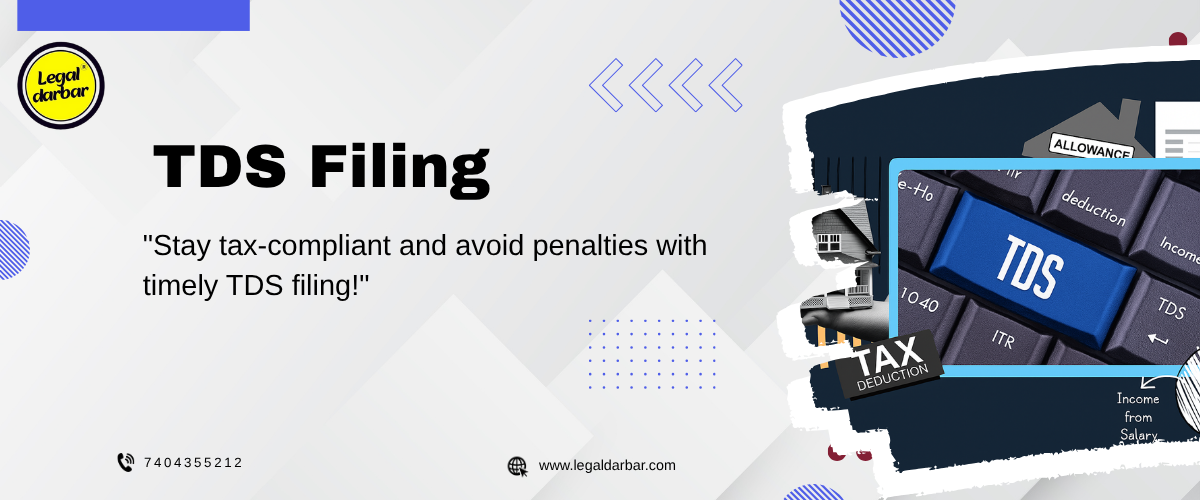
TDS Filing in India:
One of the most crucial elements of the Indian tax system is Tax Deducted at Source (TDS). To prevent fines and guarantee seamless financial operations, it is essential to comprehend and abide by TDS filing regulations, regardless of whether you are a freelancer, business owner, or salaried worker.
With professional legal and accounting assistance, we at Legal Darbar streamline the difficult TDS return filing process. Let’s go over all the information you require regarding TDS filing in India.
What is TDS (Tax Deducted at Source)?
The Income Tax Department introduced the TDS method, which requires the payer to deduct tax before paying the payee. It guarantees that taxes are collected by the government at the point of income. Salary, rent, interest, commission, and professional expenses are typical examples.
Who Needs to File TDS Returns?
TDS return filing is mandatory for:
-
Companies and LLPs
-
Proprietorships and partnerships (if audit is applicable)
-
Individuals making specified payments like rent, salaries, or contractor fees above prescribed limits
If you’re deducting TDS, you must file TDS returns quarterly with the Income Tax Department.
TDS Return Filing Due Dates
| Quarter | Period Covered | Due Date |
|---|---|---|
| Q1 | 1st April – 30th June | 31st July |
| Q2 | 1st July – 30th September | 31st October |
| Q3 | 1st October – 31st December | 31st January |
| Q4 | 1st January – 31st March | 31st May |
Failing to file on time can attract penalties and interest.
How to File TDS Return Online?
- TAN (Tax Deduction and Collection Account Number) should be obtained.
- When making a payment, deduct TDS at the appropriate rates.
- Use Challan 281 on the NSDL website to deposit TDS.
- Utilise software or consult a tax advisor to prepare your TDS return.
- Use the File Validation Utility (FVU) to validate.
- Using your DSC, upload the return to the TRACES site.
- Download Forms 16 and 16A once they have been processed.
Legal Darbar can accurately and promptly file your TDS, saving you the trouble.
Documents Required for TDS Filing
-
TAN and PAN of deductor and deductee
-
Challan details (Challan Identification Number – CIN)
-
Deductee details (Name, PAN, Amount paid, TDS deducted)
-
Salary or contract/payment details
-
Form 24Q / 26Q / 27Q depending on the type of deduction
Penalties for Non-Compliance
Penalties for Non-Compliance
| Default | Penalty |
|---|---|
| Late filing | ₹200/day under Section 234E |
| Failure to file | Up to ₹1,00,000 under Section 271H |
| Interest on late payment | 1% or 1.5% per month depending on the default |
Why Choose Legal Darbar for TDS Filing?
- Expert consultation and end-to-end support
- On-time filing with 100% accuracy
- PAN verification and challan reconciliation
- Support for Form 16 / Form 16A generation
- Affordable packages for individuals, startups & SMEs
Conclusion:
For both individuals and corporations, filing TDS returns is a sign of prudent financial behaviour in addition to being required by law. The procedure can be daunting because to the stringent timelines, documentation, and compliance regulations, but it doesn’t have to be.
You may guarantee stress-free, accurate, and timely TDS return filing by working with professionals like Legal Darbar. Our knowledgeable staff is available to assist you at every stage, regardless of whether you are a first-time filer or overseeing large deductions for your business.
Continue to comply. Avoid any hassles. Choose Legal Darbar for all your TDS filing needs.
Frequently Asked Questions (FAQs):
Yes, if you’re making payments that attract TDS (like rent over ₹50,000/month), you must file returns.
Yes, revised returns can be filed if there are errors in PAN, challan details, or deductee info.
Form 24Q is for TDS on salaries, and Form 26Q is for TDS on non-salary payments like contractor fees.
TDS must be deposited by the 7th of the following month in which it is deducted. For March, the due date is 30th April.
Late deposit attracts interest at 1.5% per month, along with penalties for non-compliance under the Income Tax Act.
Form 16 is a certificate issued by employers to employees detailing the TDS deducted on salary. It is mandatory for employers to issue it annually.
TDS (Tax Deducted at Source) is collected by the payer, while TCS (Tax Collected at Source) is collected by the seller from the buyer at the time of sale.
